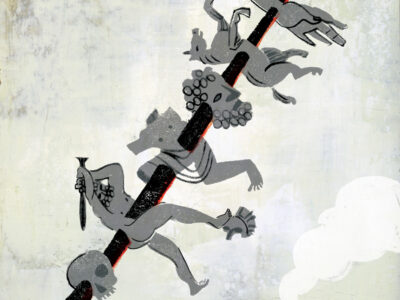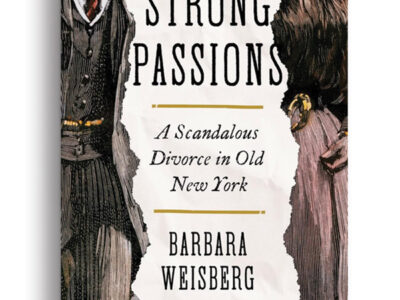
Deconstructing the literary-awards industry.
By Ben Yagoda
Based on quick searches of my memory and the premises, I possess only one trophy. Well, it’s not exactly a trophy—it’s a small laminated plaque I earned by losing two tennis matches in a double-elimination tournament, then beating two other losers to become “Last Chance Champion.”
This puts me at a severe disadvantage next to John Updike, who, according to James F. English, has accumulated 39 awards, among them three National Book Critics Circle Awards, two Pulitzer Prizes, and one Kutztown University Foundation Director’s Award. Of course, even Updike must bow down before Michael Jackson, who by English’s reckoning has 240 prizes in his trophy case, including three Children’s Choice Awards. A bit awkward, that.
According to the author, a professor in and chair of Penn’s English department, Updike and Jackson aren’t anomalies, merely exemplars of a profound long-term trend. The “stunning rise” of prizes in literature and the arts, English writes in his new book, “is one of the great untold stories of modern cultural life.” He credibly tells that story in The Economy of Prestige: Prizes, Awards, and the Circulation of Cultural Value. I had always taken it as a matter of course that the proper way to acknowledge and reward artistic achievement was with a prize. After reading the book, I realized how odd the custom is.
English traces the practice back to the sixth century B.C., when competitions for musicians, poets, playwrights, and dramatic troupes were a feature of Greek festivals. But the roots of modern prize-mania were in the late 19th and early 20th century, most notably in the Nobel Prize, which began in 1901 and established a daunting model for all subsequent cultural awards. (Nobels are of course awarded in Peace, Economics, and three scientific fields, but English concentrates on the Literature Prize.) English acutely deconstructs the circumstances of the Nobel. Munitions manufacturer Alfred Nobel established the prize in his will, thus “laundering his economic fortune and symbolic reputation through a series of cleansing cultural transactions.” The vast endowment made the Nobel an immediate force: The 1901 prize was worth about three quarters of a million inflation-adjusted dollars. That prize went to a French poet named Sully Prudhomme, thus establishing another feature of major awards: They are often questionable, and even more often questioned.
That controversy characteristically attends awards is no coincidence, English argues. Drawing on the work of Pierre Bourdieu and other theorists of cultural studies, he views the cosmos of prizes in economic terms—where the currency is not just dollars but also prestige and fame. Awarding a major prize is a complex transaction, to which the giver and receiver each bring separate and usually conflicting wish-lists—neither one of which is merely or purely the recognition of artistic excellence, whatever that is. The success of Britain’s main literary award, the Booker Prize (now called the Man Booker Prize), “is bound up with the annual flurry of scandal that attends it in the dailies and the literary press.” It is now almost required for a Booker winner to denounce or disparage the award, a complicit gesture that simultaneously bolsters his or her own artistic standing and increases the fame (or notoriety) of the Booker.
Scandal also erupts when it comes out that a winner has “campaigned” for an award, thus spoiling the fiction that the selection process is pure, disinterested, and scientific. English has a good section on how in 1987, after Toni Morrison’s novel Beloved had failed to win the National Book Award and the National Book Critics Circle Award, the author and a delegation of her supporters and friends made a high-profile effort to get the book a Pulitzer. It was a gamble, and (in English’s terms) Morrison spent some of her hard-won fund of dignity and autonomy, but it paid off. She not only won the Pulitzer but six years later traveled to Stockholm to collect a Nobel.
English overlooks one insidious quality of the awards culture: the way artistic production can be influenced or even determined by the allure of awards. The clearest case of this is Oprah’s Books, the monthly recommendation by Oprah Winfrey that, in its virtual guarantee of best-seller status, has been worth more in monetary terms (though less in prestige) than all the other American literary awards combined. Winfrey’s apparent preference for high-toned, poignant but ultimately uplifting family sagas actually created a new publishing category, with novelists and editors obviously conceiving and executing books as Oprah-worthy picks.
Those who are considering reading The Economy of Prestige should know that it has a few of the I’m-going-to-tell-what-I’ve-just-shown passages often found in scholarly works, as well as some sections that belabor what would seem to be fairly obvious. English is not an abuser of academic jargon, but he does favor long, periodic sentences in the Samuel Johnson manner. The 154-word one on page 307 takes the prize.
Ben Yagoda, professor of English at the University of Delaware, is the author of several books, including If You Catch an Adjective, Kill It: The Parts of Speech, for Better and/or Worse, out in October.




